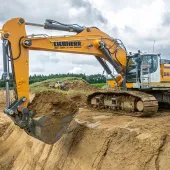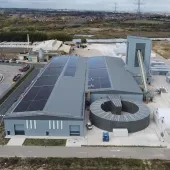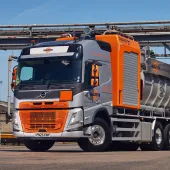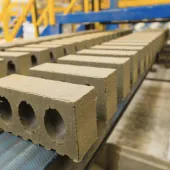Production system upgrade pays off for Wienerberger
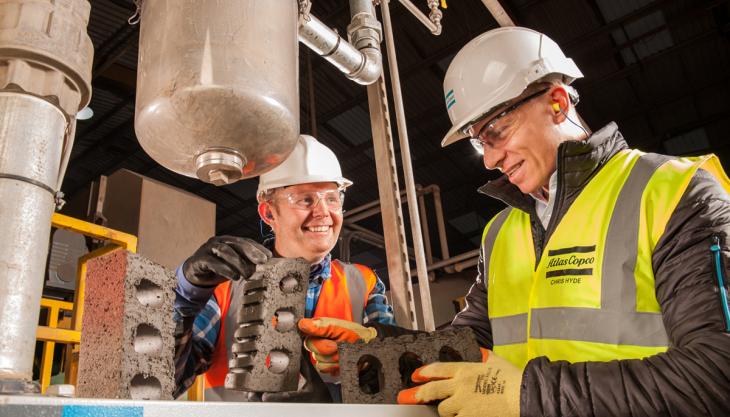
Atlas Copco compressed air and vacuum system makeover delivers energy savings and reduction in downtime
ATLAS Copco’s compressed-air and vacuum systems upgrade for Manchester-based brick makers Wienerberger Ltd is resulting in significant savings in energy costs, estimated to be around £38,000 per annum, along with reduced CO2 emissions and production downtime, plus the added benefit of a short-term payback.
The company’s Denton plant, near Manchester, is one of 14 Wienerberger production sites in the UK providing wall, roof and landscaping innovations. It is a major part of global building solutions manufacturer Wienerberger Building Solutions, the world’s largest producer of bricks and clay blocks, and the market leader for clay roof tiles.
The existing compressor system upgrade project at the Windmill Lane factory was triggered by episodes of unreliability. This led to a stark choice between carrying out costly motor rewinds or taking the longer view and replacing the compressors with state-of-the-art alternatives offering higher efficiency and dependable performance.
The compressor installation’s primary function in brick production was a 7-bar air supply to pneumatic cylinders powering the clutches of the mixers blending essential additives with the basic ground and milled clay processing operation, and those of the extruders. This, together with the final sandblast treatment, determined the quality, performance and appearance of the finished products.
There were similar performance and efficiency issues with the vacuum pump system employed to remove air from the brick material before extrusion, forming and kiln firing. Operation was intermittent because of problems running cooling water through the pumps, whose design offered only limited opportunity for corrective maintenance.
To rectify these problem areas of his manufacturing processes, Miles Coppinger, Wienerberger’s director of production North, called on the services of Atlas Copco, specialist suppliers of both compressed air and vacuum systems. His decision was based on his familiarity with their products, service and reputation from experience in a previous organization.
The first task was a week-long iiTrak data-logging procedure to determine the energy usage of the existing plant, the air demand requirements and the system’s capabilities in order to establish a flow profile. The results demonstrated a clear opportunity to make significant energy savings, reduce the company’s carbon footprint and introduce a new level of reliability and performance.
The recommendation was for a complete replacement compressed-air installation. This would comprise an Atlas Copco GA90VSD+FF rotary screw compressor, a fixed-speed GA 75+ machine together with an FX15 refrigerant dryer, a 3,000-litre air receiver with electronic zero-loss drain, plus ancillaries including an OSC oil/water separator, all connected by an Optimizer 4.0 central controller.
To minimize pressure drops in the air network, the existing 4-in galvanized pipework was to be replaced with an Atlas Copco AirNet 80mm modular aluminium system, installed by local premier distributors Pennine Pneumatic Services. To contribute to overall energy efficiency, the compressors would feature winter/summer ducting to aid heat recovery and direct hot air into the factory during colder months via manual vent switching.
The Denton plant had previously used liquid ring vacuum technology for clay extrusion but required a more efficient solution which would also allow them to remove the risk of Legionella from the cooling towers used to support the existing liquid ring pumps.
The new vacuum system needed to be suitable for the high water content and high ambient temperatures involved in Wienerberger’s clay extrusion application. Based on the substantial energy-saving potential and the option to remove the cooling requirement, Wienerberger chose the Atlas Copco GHS585 VSD+ Humid oil-sealed, rotary screw vacuum pump to meet the site’s requirements.
The smart features of the Atlas Copco GHS585 VSD+ allow Wienerberger to link directly into the application’s PLC system, providing direct control of the pump when the production line is running. This allowed the customer to benefit from energy savings due to the set point control feature of the vacuum pump, which optimizes the process and provides maximum energy efficiency by ensuring that only the vacuum required is generated.
Furthermore, it has now become the Wienerberger parent company’s policy to switch from liquid ring vacuum pumps to rotary screw vacuum pumps in all its production plants. The whole operation was carried out over a three-phase installation plan and included solving an accommodation problem in siting the new equipment. In the first phase, the GA75+ compressor and FX dryer back-up units were installed in the bike store, which was eventually re-sited in the old compressor house from which the original units were removed.
The second phase saw the new main-duty compressor system equipment in place and commissioned before completion of the final phase, involving removal of the redundant units and installing ducting.
At the same time, the central control and monitoring system was linked to the newly installed Atlas Copco GHS VSD+ oil-sealed and air-cooled rotary screw vacuum pump, which solved the company’s air-extraction reliability issue.
The net result of this major makeover project in terms of system savings and a potential payback within only two years is good news for Miles Coppinger, who commented: ‘The estimated energy saving from the first two phases is in the region of £38,000 per year. By replacing the old equipment, we avoided the cost of overhauls, which would have amounted to at least another £30,000.
‘Naturally, I will keep a sharp eye on continuing performance and will be establishing data from sensors both in terms of kW/h/cu metre air power costs, but also as power related to the total volume of product output for any given period.’
He added that he valued the technical support and efficiency with which the project was conducted by Atlas Copco and the peace of mind that a Total Responsibility service plan offered: ‘I am happy to work with them and pleased to report the good news that Wienerberger have signed a blanket agreement to make Atlas Copco a preferred supplier in the UK.’
An additional benefit derived from the new installation is that Wienerberger have reduced their carbon footprint by almost 200,000kg per annum.
Moreover, the company is safe in the knowledge that key components of the system are proven to be top-performing energy-reducing products. These are the NEOS inverter in the GA VSD+ compressor and the Optimizer 4.0 master controller. Both are included in the Carbon Trust’s Energy Technology List, which carries entitlement for businesses that purchase these technologies to accelerated tax relief on their profits.



